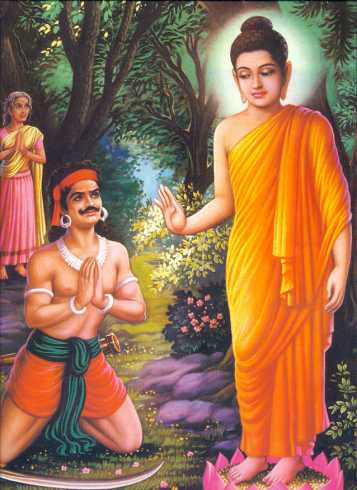A Story Inspired by the Heart Sutra, Part 4
By Desmond Yeoh SC
 Closely tied to his Emotions-Skandha are the Skandhas of Perception, Mental Formation and Consciousness. He saw that consciousness is the foundation of the three other Skandhas because even now, his eyes are looking and his ears are listening but he is not conscious of everything which the eye sees or the ear hears. When he is in deep meditation, sometimes his sense-perceptions are completely shut-off. At times, consciousness disappears completely as his mind goes completely blank. In deep meditation his sense consciousness disappears completely. If it can disappear, it cannot be a separate self.
Closely tied to his Emotions-Skandha are the Skandhas of Perception, Mental Formation and Consciousness. He saw that consciousness is the foundation of the three other Skandhas because even now, his eyes are looking and his ears are listening but he is not conscious of everything which the eye sees or the ear hears. When he is in deep meditation, sometimes his sense-perceptions are completely shut-off. At times, consciousness disappears completely as his mind goes completely blank. In deep meditation his sense consciousness disappears completely. If it can disappear, it cannot be a separate self.
Mental perceptions are how the mind interpret sense objects. What the mind perceives as right or wrong, virtuous or evil, pleasing or repulsive and so on. If the mind perceives a deed as virtuous, it would result in happy emotions. On the other hand, if the deed is seen as evil, it would trigger anger, hatred or guilt.
How the mind perceives pain will affect One’s emotions. When an enemy cuts a person, he will feel anger but when a doctor does the same thing, he will free grateful instead.
He considered if he controls his mental perceptions. Did he decide for himself what is right or wrong? When he was a toddler, he did not have any concept what is right or wrong. As he grew up, others put in his mind what is right or wrong. Layers and layers of mental conditioning were added as he grew up. He smiled as he recalled the Buddha’s teaching that spiritual advancement is the process of peeling away the layers of conditioning like how the layers of an onion is peeled away…until nothing remains. Only then, can one achieve freedom.
Mental perceptions also depend on One’s circumstances. As a monk, he would never harm another human being but some of his childhood friends who became soldiers train every day to kill more effectively and the better they got, the more respect they gained. Those who have killed before were promoted and treated as heroes. This is especially so for the Sakya clan, a warrior clan which the Buddha and many of his disciples are from.
He searched his mind and could not find anything that originated from himself. His mind appears like a book which others have written into; with or without his consent; and whether he liked it or not.
Contained within his Perception-Skandha are all the persons who have come into his life and written in his book of life. His mind is not a separate self. His perceptions are not a separate self but a bundle of causes and conditions.
Mental formations are the movies, pictures and voices in his head. Perhaps the mental formations Skandha is what most human beings would consider as the self because their time are mostly occupied with their mental formations. Many call it day-dreaming. He learnt very early in his life as a monk that he has no control whatsoever over his mental formations. If he had, he could tell his mental formations to stop whenever he wants to meditate and be at peace. Many lay disciples of the Buddha gave up meditation because they do not understand this. They think that they are not meant to meditate. So, instead of trying to understand the mental formations, they chose to distract themselves from their own uncontrollable mind with idle gossip, useless activities and even intoxicants.
He saw that his mental formations are predominantly memories of recent events or those combined with strong emotions. He cannot choose the mental formations; the external events determine his mental formations.
Mental formations can cause much unnecessary mental suffering. Before he became a monk, when he was insulted or criticised, he would feel angry or sad for days and days because his mental formations would replay the incident over and over again. He perceived the insults and criticism as events which diminished his self-worth. But now, he views insults and criticisms as aids to help him progress spiritually and achieve greater happiness. His mental perceptions changed because the life as a monk has somewhat enabled him to let go of the illusory self to a certain extent.
He concluded that his mental formations are not a separate self but also contain myriad causes and conditions.